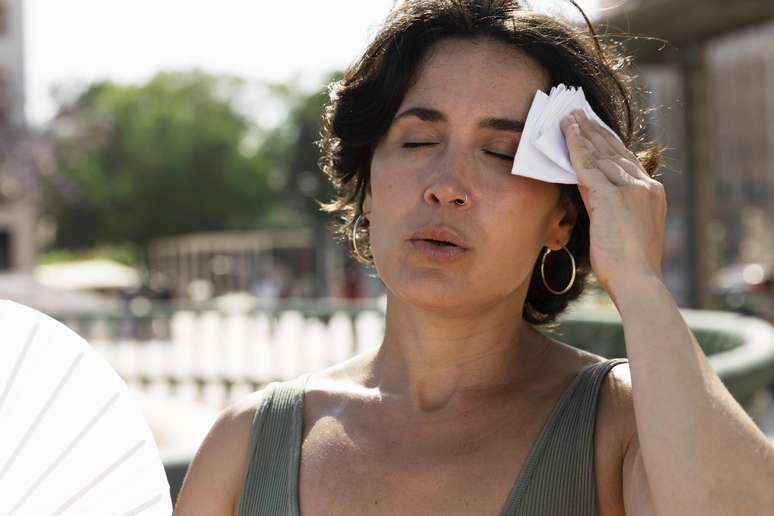Medical notice at extreme temperatures that can cause more problems in hypertensive and diabetics
Summer is not giving respite in several states in Brazil. This week, Rio de Janeiro deals with extreme heat waves, with heat heat 4, which indicates temperatures above 40 ° C, which can involve health risks, if hydration and nutrition are not adequate.
“Healthy individuals can also suffer from the effects of extreme heat, including dehydration, thermal tiredness and heat stroke, potentially serious conditions,” says Dr. Patrícia Almeida gastroenterologist and hepatologist at the Israelite hospital Albert Einstein.
The doctor lists the main assistance recommendations to high temperatures.
- Stay hydrated: the ingestion of 2-3 liters of water per day is essential. During physical activity, water replacement should be higher.
- Avoid exposure to the sun in critical times: between 10:00 and 16:00, solar radiation are more intense, increasing the risk of hyperthermia.
- Wearing light and light clothes: fabrics like cotton and linen help in the dissipation of heat.
- Avoid intense physical activities in hot times: if necessary, opt for air conditioning environments or fresher programs.
- Strengthen sun protection: use of sun protection, sunglasses and hats to prevent solar burns.
- Be aware of the signs of thermal exhaust: dizziness, extreme fatigue, intense sweating and mental confusion can indicate hyperthermia and require immediate cooling
Greater risk for those who suffer from chronic diseases
The professional underlines in level 4 heat situations, the effects on the body can be serious, especially for people with chronic diseases such as hypertension and diabetes.
“Patients with hypertension and diabetes mellitus have a greater vulnerability at extreme temperatures due to changes in cardiovascular and water and electrolyte balance,” he explains.
• Arterial hypertension: heat causes vasodilation, leading to reduced blood pressure, which can cause postural hypotension and an increased risk of falls. In addition, dehydration can reduce the volume of the blood, leading to reflected tachycardia and cardiac overload.
• Diabetes mellitus: diabetic patients, in particular those with autonomic neuropathy, can be compromised to respond to thermal regulation, becoming less efficient in the dissipation of heat. In addition, dehydration can influence renal function and decominate glucose in the blood since the lowest intake of the fluid can lead to higher blood glucose concentrations.
Essential care:
- Constant hydration: ingestion of at least 2-3 liters of water per day, adjust according to individual needs.
- Blood pressure monitoring and blood sugar: people with hypertension should be aware of postural hypotension and diabetics should avoid dehydration to prevent hyperglycaemia.
- Avoid exposure to heat: stay in cool places and avoid external activities between 10 and 16:00.
- Revision of drugs: some antihypertensive (diuretics, beta-blockers) and hypoglycaemi may require adjustments under medical supervision.
Recommended foods and those that should be avoided
Food plays a key role in the thermal regulation of the body and in the prevention of dehydration and imbalances.
Recommended foods:
- Fruits and vegetables rich in water: watermelon, melon, cucumber, lettuce, courgettes and tomatoes, for example.
- Magre proteins: fish, chicken and legumes help to maintain muscle mass without overloading digestion l.
- Foods rich in potassium and magnesium: banana water, avocado and coconut help in electrolytic regulation, preventing cramps and fatigue.
- Natural isotonic drinks: coconut water and natural sugar juices help in the replacement of electrolytes.
Foods that should be avoided:
- Ultra elaborate and sodium foods: incorporated and canned fast food can aggravate fluid retention and stop the body’s balance process.
- Excess coffee and alcohol: they can have a diuretic effect, favoring dehydration.
- Fatty and difficult digestion foods: frying and red meat can overload the digestive tract.
Source: Terra
Ben Stock is a lifestyle journalist and author at Gossipify. He writes about topics such as health, wellness, travel, food and home decor. He provides practical advice and inspiration to improve well-being, keeps readers up to date with latest lifestyle news and trends, known for his engaging writing style, in-depth analysis and unique perspectives.








